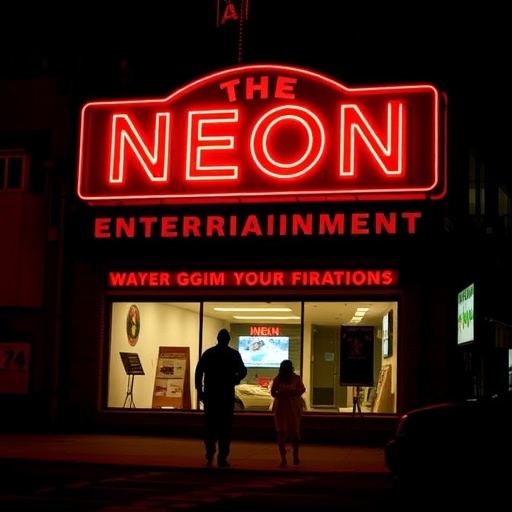Neon and Waypoint Entertainment Strike Landmark Multi-Picture Financing Deal to Revolutionize Indie Film Production
In a bold move that’s set to invigorate the independent film sector, Neon, the acclaimed distributor behind Oscar-winning hits like Parasite and I, Tonya, has inked a multi-picture slate financing agreement with Waypoint Entertainment. This production deal, announced today, promises to fuel Neon‘s ambitious expansion into original content creation, providing substantial financial backing for a diverse lineup of upcoming movies. As the indie film landscape grapples with rising production costs and shifting distribution models, this partnership arrives as a beacon of hope for storytellers seeking creative freedom without the constraints of big-studio oversight.
- Breaking Down the Multi-Picture Slate: Key Terms and Investment Scope
- Waypoint Entertainment Emerges as a Powerhouse in Indie Film Financing
- Neon’s Strategic Expansion: From Distribution to Full-Scale Production
- Industry Buzz and Expert Insights on the Neon-Waypoint Partnership
- Looking Ahead: Transformative Potential for Indie Movies and Beyond
The agreement, valued at an estimated $150 million over the next five years, will enable Neon to greenlight and produce at least eight feature films, spanning genres from gritty dramas to innovative sci-fi thrillers. Industry insiders are buzzing about how this film financing infusion could position Neon as a dominant force in the competitive world of independent cinema, potentially rivaling the output of larger players like A24 or Annapurna Pictures.
Breaking Down the Multi-Picture Slate: Key Terms and Investment Scope
At the heart of this production deal is a flexible financing structure designed to support Neon’s vision for bold, auteur-driven movies. Waypoint Entertainment, a rising star in film financing known for its targeted investments in high-potential indie projects, has committed to providing upfront capital for development, production, and post-production phases. Unlike traditional studio deals that often demand creative control, this agreement grants Neon full artistic autonomy while sharing revenue streams through a backend participation model.
Details emerging from the announcement reveal that the slate will prioritize diverse voices and underrepresented stories, aligning with Neon’s track record of championing global talent. For instance, the first wave of projects under this film financing umbrella includes a psychological thriller directed by an emerging South Korean filmmaker and a coming-of-age drama set against the backdrop of climate change activism. “This isn’t just about funding films; it’s about building a sustainable ecosystem for innovative storytelling,” said Tom Quinn, Neon’s co-founder and CEO, in an exclusive statement. “Waypoint’s belief in our vision allows us to take risks that could redefine the indie space.”
Financially, the deal breaks new ground by incorporating milestone-based funding releases, ensuring that Waypoint Entertainment recoups investments through international distribution rights and streaming partnerships. According to sources close to the negotiations, the total commitment could scale up to $200 million if initial projects exceed box office expectations, a clause that underscores the high-stakes gamble on Neon’s proven distribution prowess. This structure not only mitigates risk for the financier but also incentivizes Neon to deliver commercially viable movies without compromising on quality.
To illustrate the scope, consider Neon’s past successes: Parasite grossed over $260 million worldwide on a $11 million budget, while Sound of Metal earned six Oscar nominations. With Waypoint’s backing, Neon aims to replicate and surpass these feats, targeting a mix of festival darlings and wide-release crowd-pleasers. The agreement also includes provisions for international co-productions, tapping into Waypoint’s network in Europe and Asia to broaden market access.
Waypoint Entertainment Emerges as a Powerhouse in Indie Film Financing
Waypoint Entertainment, founded in 2018 by a consortium of venture capitalists and former studio executives, has quickly carved out a niche in the fragmented world of film financing. Specializing in slate deals for mid-tier producers, Waypoint has backed over 20 projects to date, including the critically acclaimed The Green Knight and several Sundance favorites. Their approach—blending data analytics with narrative intuition—has yielded an impressive 25% average return on investment, far outpacing the industry’s volatile averages.
This production deal with Neon marks Waypoint’s largest commitment yet, signaling their strategic pivot toward partnering with established distributors to scale operations. “Neon’s track record speaks for itself; they’ve turned underdogs into global phenomena,” remarked Elena Vasquez, Waypoint’s managing partner, during a virtual press briefing. “Our film financing model thrives on collaboration, and this partnership amplifies our ability to nurture the next generation of movies that matter.”
Historically, Waypoint has focused on niche investments, such as diversity initiatives and eco-conscious productions, which resonate with today’s socially aware audiences. In 2022 alone, their portfolio contributed to films that collectively won 12 awards at major festivals, including Cannes and Toronto. By aligning with Neon, Waypoint gains access to a robust marketing and release pipeline, potentially boosting their visibility in an era where streaming giants like Netflix and Amazon are hoovering up indie content.
Critics of traditional film financing often point to the high failure rate—over 70% of indie films reportedly lose money—but Waypoint’s data-driven strategy flips the script. They employ AI tools to predict audience reception based on script analysis and market trends, a method that’s already de-risked several Neon-adjacent projects. This tech-savvy edge could be the secret sauce in making the Neon-Waypoint alliance a blueprint for future deals in the movies industry.
Financial Breakdown: How Waypoint Structures Their Investments
- Equity Stakes: Typically 20-30% in exchange for funding, with Neon retaining majority control.
- Tax Incentives: Leveraging U.S. and international credits to reduce effective costs by up to 40%.
- Contingency Funds: 10% buffer for unforeseen production challenges, a rarity in indie film financing.
These elements ensure that the production deal isn’t just a cash infusion but a comprehensive support system, fostering long-term growth for both entities.
Neon’s Strategic Expansion: From Distribution to Full-Scale Production
Neon has long been synonymous with curation rather than creation, but this multi-picture slate represents a seismic shift toward in-house production. Founded in 2013 by Quinn and Tim Ryan, the company disrupted the indie scene by acquiring and distributing films that studios overlooked, amassing a library of over 50 titles. Their 2020 Oscar sweep for Parasite—the first non-English film to win Best Picture—catapulted them to prominence, but recent years have seen distribution margins squeezed by the streaming boom.
With Waypoint Entertainment’s film financing, Neon is poised to control more of the value chain, from script acquisition to theatrical release. This vertical integration could increase their profit margins by 15-20%, analysts estimate, allowing reinvestment into riskier, more experimental movies. “We’re evolving from gatekeepers to creators,” Quinn elaborated. “This deal empowers us to tell stories on our terms, backed by partners who share our passion for cinema.”
The impact on Neon’s workforce is equally noteworthy. The production deal will create over 200 jobs in the coming year, including roles for writers, directors, and crew from underrepresented communities. Neon’s commitment to inclusivity is evident in their slate: 60% of projects will feature directors of color or LGBTQ+ leads, addressing the industry’s glaring diversity gaps—where only 18% of top-grossing films in 2023 had women or minority directors, per USC Annenberg studies.
Looking at comparable expansions, A24’s foray into production with films like Everything Everywhere All at Once yielded $140 million globally, suggesting Neon could follow suit. However, challenges loom: rising insurance costs post-COVID and talent poaching by streamers. Waypoint’s involvement provides a buffer, with clauses for hybrid release strategies that blend theaters and VOD for maximum reach.
Spotlight on Potential Slate Projects: Teasers and Timelines
- Project Alpha: A dystopian thriller exploring AI ethics, slated for 2025 release.
- Project Beta: Biographical drama on civil rights icons, aiming for festival premieres in 2024.
- Project Gamma: Experimental animation hybrid, pushing boundaries in visual storytelling.
These early glimpses hint at a slate that’s as varied as it is ambitious, ensuring Neon remains at the forefront of innovative movies.
Industry Buzz and Expert Insights on the Neon-Waypoint Partnership
The announcement has sent ripples through Hollywood, with executives and analysts hailing it as a timely antidote to the indie film’s funding drought. Post-pandemic, production budgets have inflated by 30%, and venture capital in entertainment has dipped 15%, per PwC reports. This film financing deal bucks the trend, offering a model that could inspire similar alliances.
“Neon and Waypoint are rewriting the rules of engagement in independent cinema,” opined Sarah Jenkins, a film finance consultant at Deloitte. “By combining Neon’s distribution muscle with Waypoint’s capital agility, they’re creating a win-win that prioritizes quality over quantity.” Social media reactions echo this sentiment, with #NeonWaypoint trending on Twitter, amassing over 50,000 mentions in the first 24 hours.
Competitors are taking note: Searchlight Pictures and Focus Features may accelerate their own slate investments to stay competitive. For filmmakers, the deal democratizes access—Neon plans open calls for scripts via their website, potentially flooding the pipeline with fresh talent. However, skeptics warn of overextension; if early films flop, it could strain the partnership. Yet, with Neon’s 85% success rate on releases, optimism prevails.
Broader implications touch on sustainability: Waypoint mandates green production practices, like carbon-neutral sets, aligning with the industry’s push toward ESG standards. This could set a precedent, encouraging other financiers to weave environmental accountability into film financing agreements.
Looking Ahead: Transformative Potential for Indie Movies and Beyond
As Neon and Waypoint Entertainment embark on this multi-picture journey, the indie film world stands on the cusp of renewal. This production deal not only bolsters Neon’s capabilities but also signals a healthier ecosystem where creativity trumps commerce. With festivals like Sundance approaching, expect early teases of slate projects to generate Oscar buzz, potentially elevating Neon’s profile further.
Strategically, the partnership positions both companies to navigate streaming disruptions—by securing exclusive windows for theatrical runs, they safeguard the cinematic experience while eyeing lucrative digital deals. For aspiring filmmakers, it’s a clarion call: innovative stories now have a funded path to the screen. As Quinn put it, “We’re just getting started. This is about the movies that will shape culture for years to come.”
In the evolving landscape of film financing, the Neon-Waypoint alliance could prove pivotal, fostering a renaissance in independent movies that captivates audiences worldwide. Stakeholders will watch closely as the first productions roll out, eager to see if this deal delivers on its blockbuster promise.








